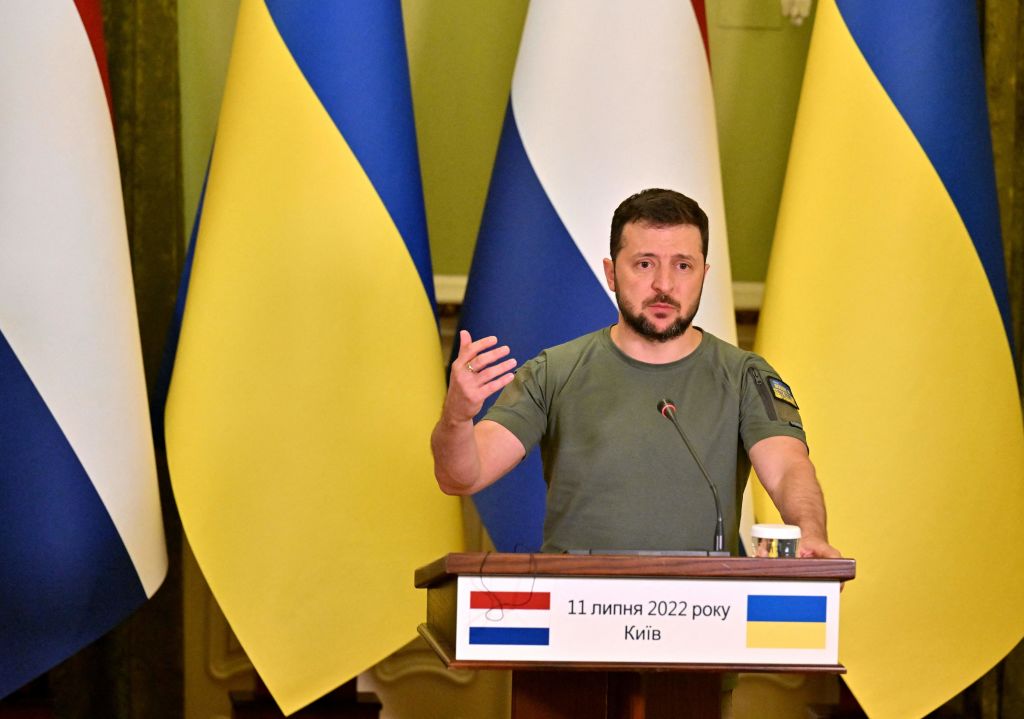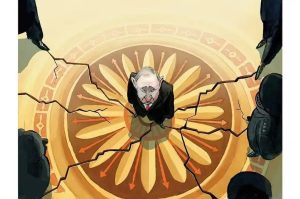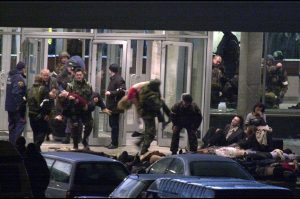On February 24, Volodymyr Zelensky, the comedic actor-turned-president of Ukraine, addressed his countrymen at the same hour Russian missiles were landing in multiple Ukrainian cities simultaneously. Clad in olive garb and sporting a light stubble on his face, Zelensky promised his citizens victory for Ukraine and defeat for the Russians — and he implored the Russian people to protest the actions of their government in Moscow and St. Petersburg.
As the war entered its sixth month this Sunday, Zelensky — this time dressed in a camouflage army uniform with a full beard — is just as defiant and sure of victory today as he was on that depressing February night. “Even the occupiers admit that we will win,” Zelensky boasted during his daily speech to the nation. Whether Zelensky actually believes what he’s saying is beside the point; the speech, like all of the speeches he has delivered since the conflict broke out, are designed to rally support for the cause and preserve Western arms flows.
Over the last 200 years, inter-state wars have lasted an average of 100 days, or roughly three months. The war in Ukraine has already outlasted that time span — and based on the rhetoric coming out of Kyiv and Moscow, it could very well drag on for another six, twelve, or eighteen months (NATO Secretary General Jens Stoltenberg said in January the war could last years). There is no sign whatsoever that the combatants are prepared to stop fighting and start negotiating. Russia’s cruise missile strike on the Odessa port on Saturday, less than twenty-four hours after Moscow signed an agreement to help facilitate grain shipments out of that very same port, only reaffirmed Zelensky’s belief that talking with the Russians about anything is a waste of time. For Russian President Vladimir Putin, a man who simply doesn’t countenance defeat, that’s just as well.
After a full five months, whatever exit ramps existed have been burned. For the Ukrainian and Russian political leaderships, there is only one direction on the highway: to trudge forward while avoiding the minefield of potholes along the way. The only question is how much damage and destruction will occur between now and the time both sides conclude it’s more sensible to begin exploring a way out at the conference table — assuming we even reach this scenario.
The war itself is in a paradoxical state. It’s highly active, yet also slow and muddled. After the Russian army captured the twin cities of Severodonetsk and Lysychansk in June, solidifying their control of the Luhansk oblast, the frontlines haven’t moved much (if at all). While Russian artillery attacks and cruise missile strikes in neighboring Donetsk have continued at a violent pace, the Ukrainians have been able to withstand the barrage and maintain their positions. Kyiv has utilized the dozen US-supplied HIMARS long-range artillery systems with lethal precision, neutralizing Russian ammunition dumps, command centers and logistical nodes, and the strikes are having an adverse effect on Russia’s next offensive.
Yet at the same time, Russia’s missile strikes have continued without so much as a blip. The so-called operational pause Russian Defense Minister Sergei Shoigu announced earlier this month wasn’t much of a pause at all. Every day brings more destruction, adding to the $750 billion reconstruction bill Kyiv is already confronting. If Ukraine was hoping its strong resistance in the field would force Putin to go back to the drawing board and reassess whether his war of choice was a critical mistake, then it didn’t take. Putin is just as committed to achieving his goals in Ukraine today as he was when the invasion began. The Russians are making preparations for an annexation of Ukraine’s southeastern Black Sea coastline — and while their offensive in Donetsk appears stalled, the Russian army remains intent on capturing all of the Donbas, no matter how long the operation will take. Putin firmly believes time is on his side.
Zelensky, however, feels the same way. You can’t blame him for his optimism. The Ukrainian army has exhibited considerable mettle and ingenuity in its operations, and Ukrainian troops are far better motivated than the Russians are (Ukraine is literally fighting for its sovereignty, so this conflict is an existential one in the minds of many Ukrainians). A senior US official claimed that Russia is experiencing hundreds of casualties per day, adding to the 15,000 Russians who have already been killed in the conflict — a higher toll than the Red Army’s entire decade-long morass in Afghanistan. The Ukrainians continue to receive sophisticated weaponry from the West, with Washington announcing yet another $270 million package complete with four more HIMARS, 36,000 rounds of 105mm ammunition, and more than 580 tactical drones. The Ukrainian government is preparing for a counteroffensive in the Kherson region, and Zelensky has all but ruled out peace talks until the Ukrainian army is able to recapture some of the land it lost.
Kyiv, in other words, is as persuaded in its belief of victory as Moscow is. Those of us who are monitoring this war from afar can call these beliefs delusional in the extreme, but our views don’t really matter. As long as the combatants are wedded to them, the war will continue apace.
Eventually, the war in Ukraine will end. Because neither side possesses the capability to vanquish the other, some kind of diplomatic settlement involving extremely tough and emotional trade-offs will have to be contemplated at some point. But the key phrase here is at some point. We aren’t even remotely close to it.

























